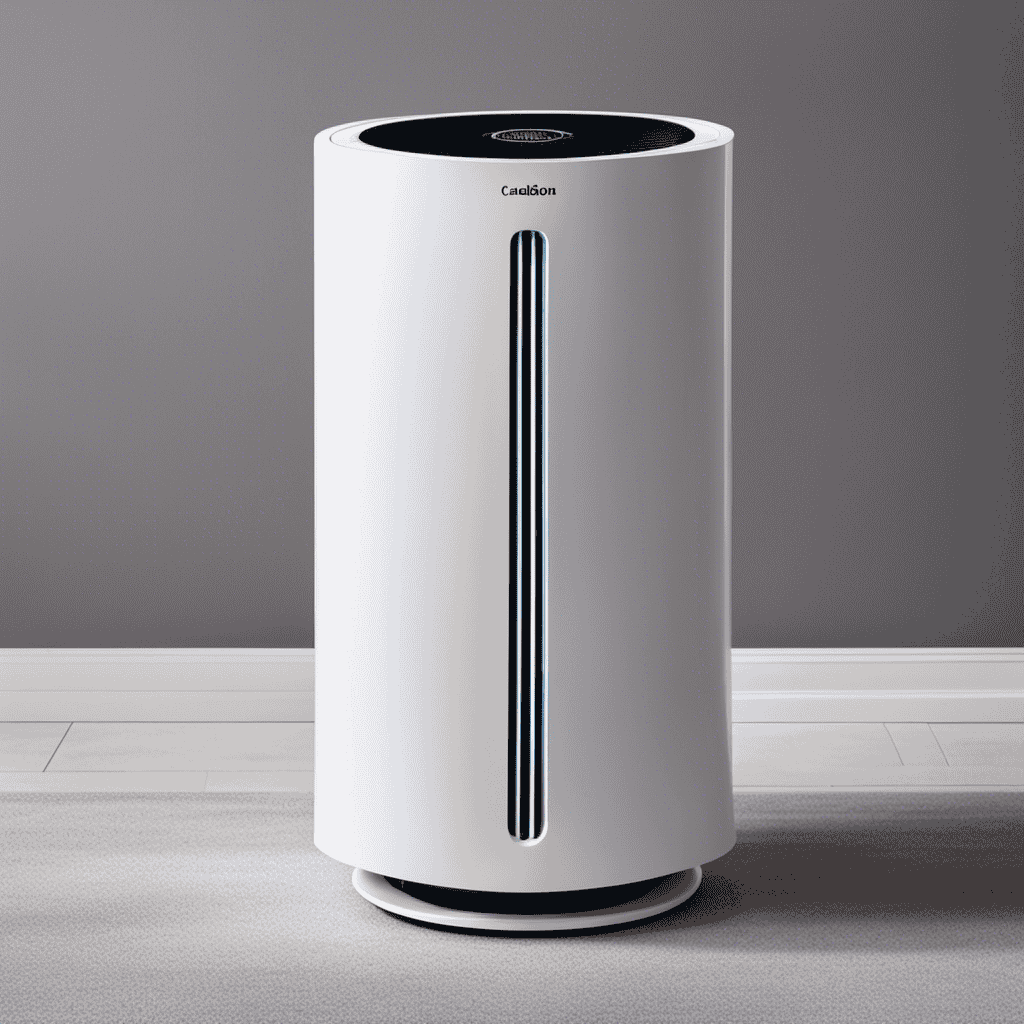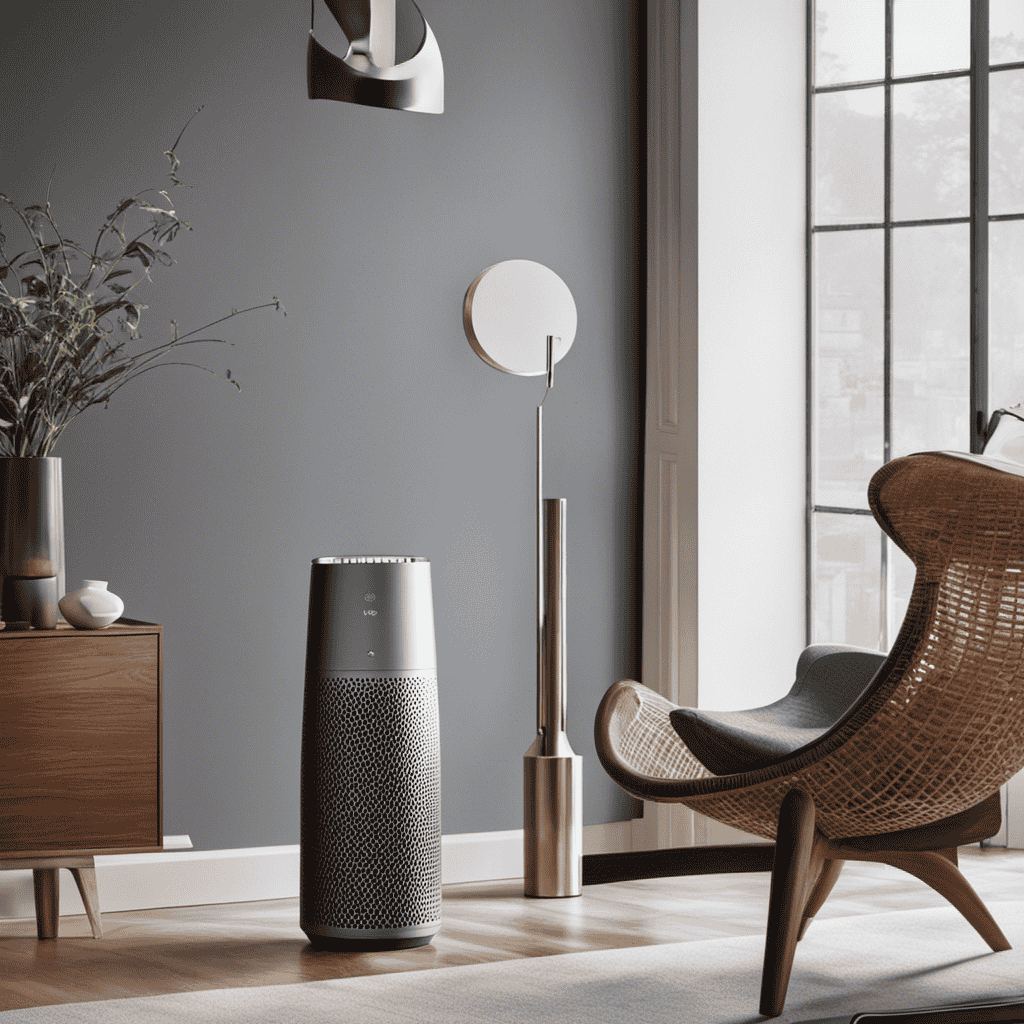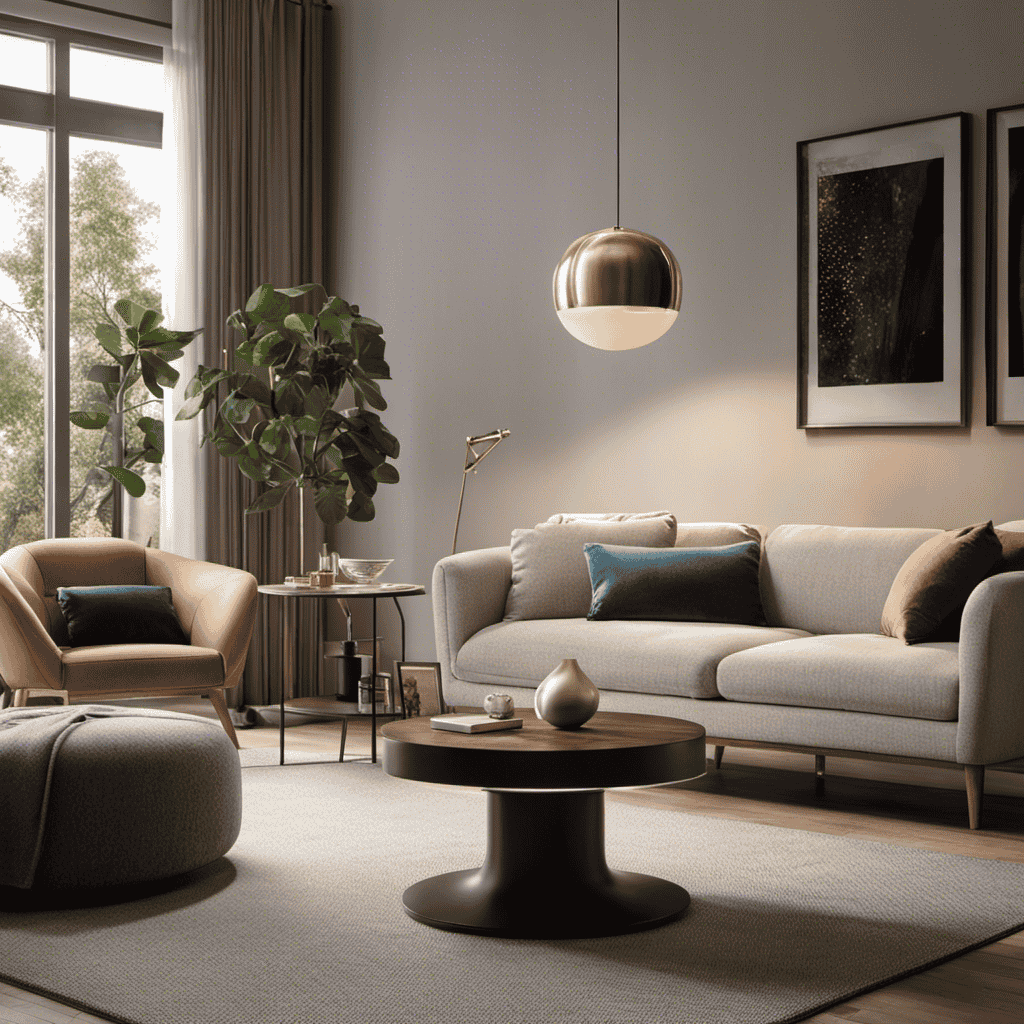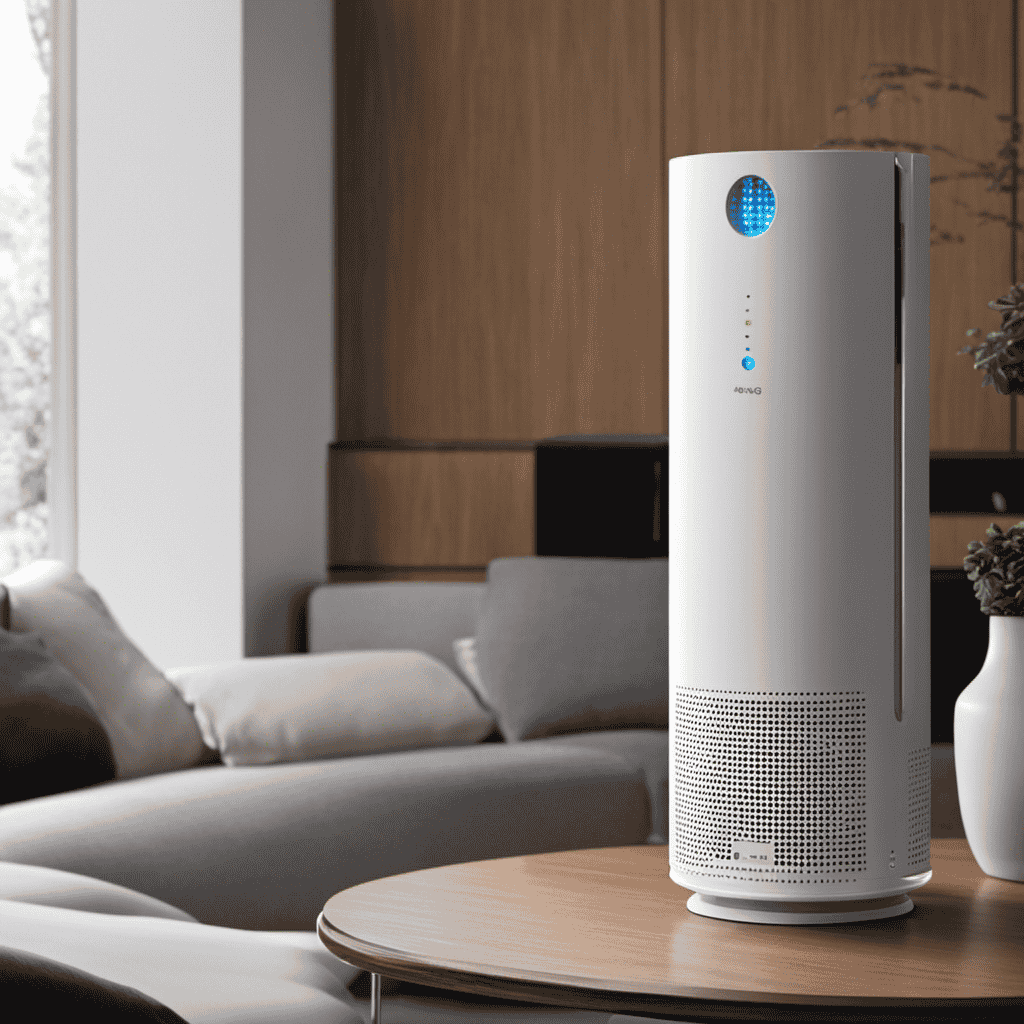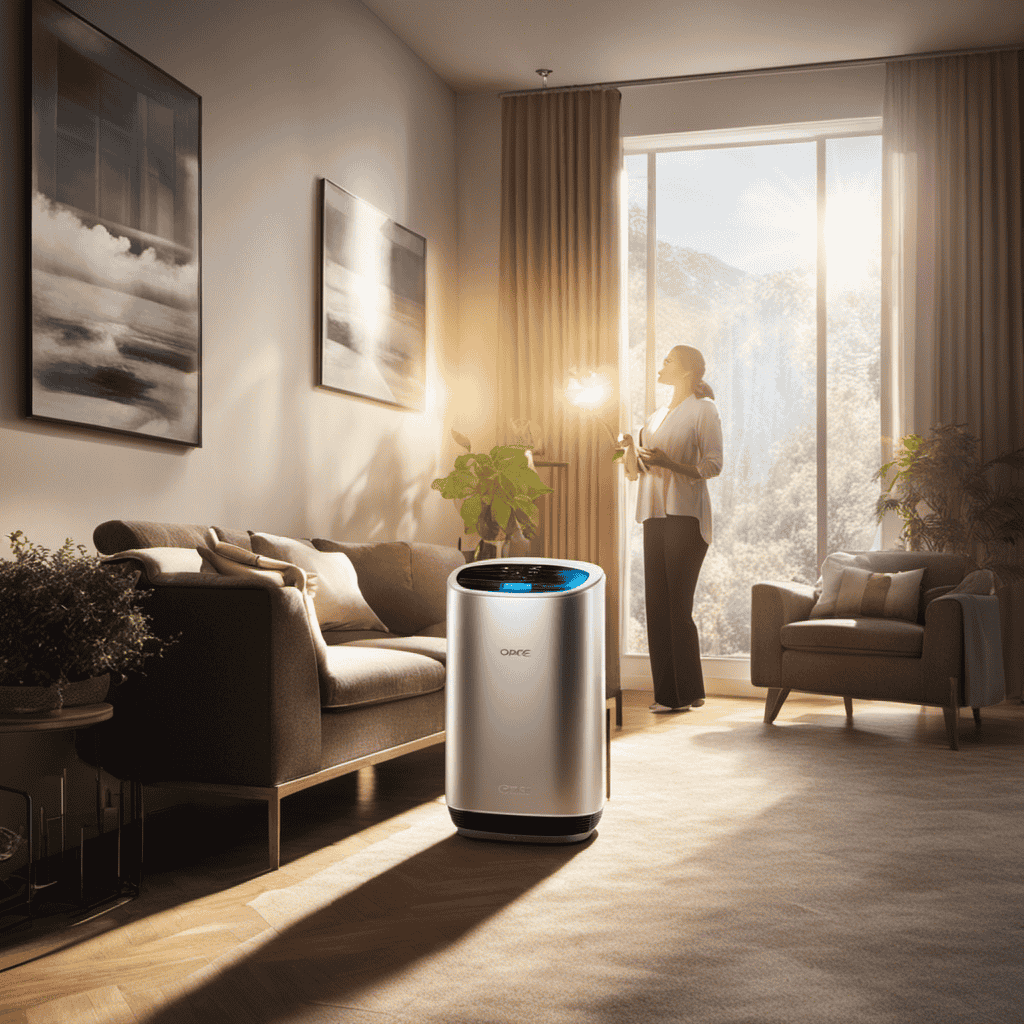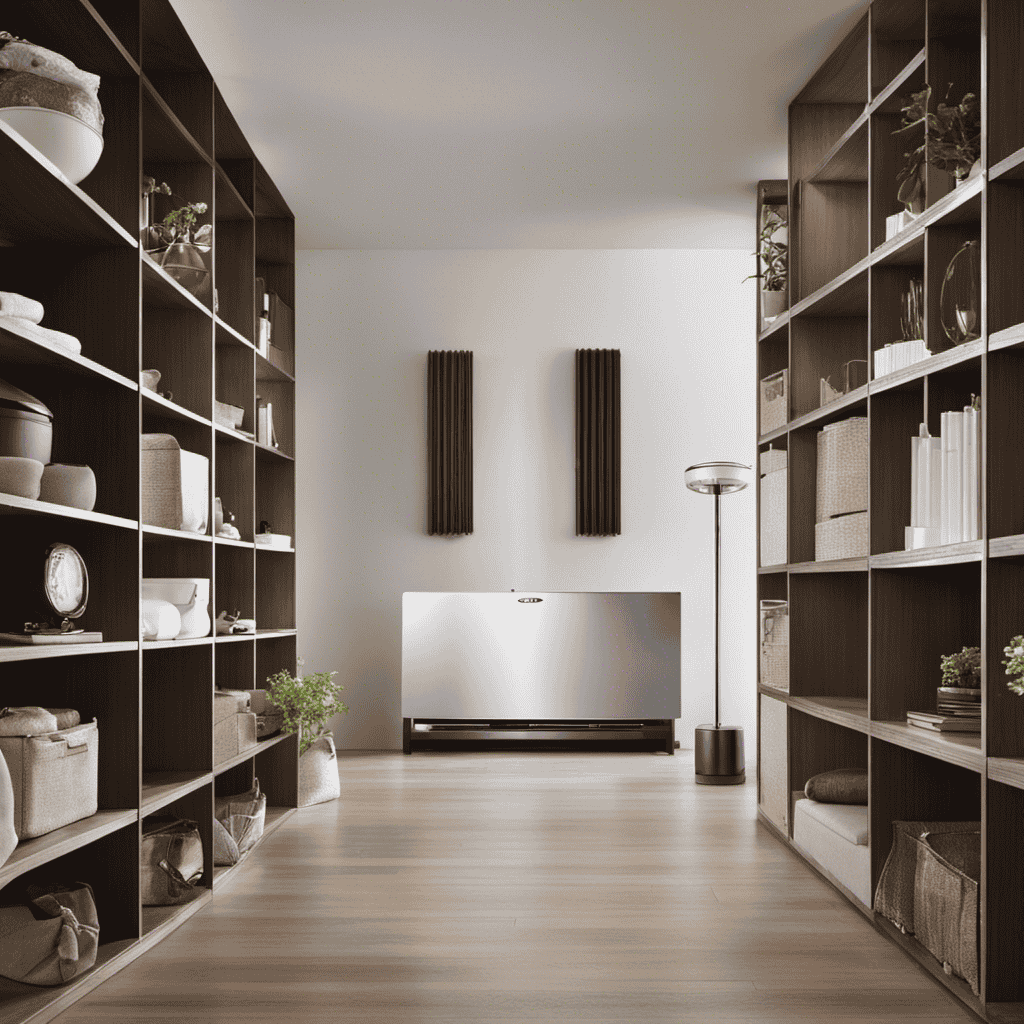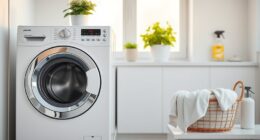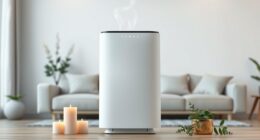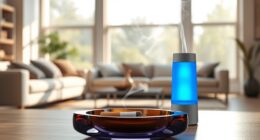Like a well-tuned engine needing regular oil changes for optimal performance, your HEPA air purifier’s carbon filter also requires regular maintenance to keep it running smoothly.
In this article, I’ll guide you through the ins and outs of how often to change your carbon filter.
By understanding the factors that affect its lifespan, recognizing signs of wear and tear, and implementing proper inspection techniques, you’ll be able to extend the life of your carbon filter and ensure your air purifier is always working at its best.
Key Takeaways
- The recommended frequency for carbon filter replacement in a HEPA air purifier is typically every 6 to 12 months.
- Regular replacement ensures optimal performance and prevents the accumulation of dirt and debris.
- Signs indicating the need for carbon filter replacement include a decrease in air purifier effectiveness, an increase in odors or lingering smells, and a decrease in the removal of harmful chemicals and gases.
- Proper inspection of the carbon filter for wear and tear, such as discoloration or darkening, persistent odors, and reduced airflow, is necessary to determine when replacement is needed.
Factors That Affect the Lifespan of a Carbon Filter
You should consider several factors that can affect the lifespan of your carbon filter.
One important factor is the quality of the filter itself. It’s recommended to invest in high-quality carbon filters from reputable brands. These brands have a reputation for producing filters that are durable and long-lasting.
Another factor to consider is the level of air pollution in your environment. If you live in an area with high levels of pollutants, your carbon filter may need to be replaced more frequently.
Additionally, regular cleaning of the carbon filter can help prolong its lifespan. There are DIY methods available for cleaning carbon filters, which can save you money in the long run.
Recommended Frequency for Carbon Filter Replacement
The recommended frequency for replacing the carbon filter in a HEPA air purifier is typically every 6 to 12 months. Regular carbon filter maintenance is crucial to ensure optimal performance and air quality in your home.
Carbon filters work by trapping and removing harmful pollutants, such as odors, chemicals, and gases from the air. Over time, these filters become saturated with contaminants, reducing their effectiveness. By replacing the carbon filter regularly, you can ensure that your air purifier continues to remove pollutants efficiently, resulting in cleaner and healthier air.
Moreover, regular filter replacement also helps prolong the lifespan of your air purifier and prevents the accumulation of dirt and debris that can hinder its performance.
Now, let’s explore the signs that indicate it’s time to change the carbon filter.
Signs That Indicate It’s Time to Change the Carbon Filter
If you notice a decrease in the effectiveness of your air purifier, it may be time for a new carbon filter. Carbon filters play a crucial role in removing odors, chemicals, and gases from the air. Over time, however, these filters can become saturated and lose their effectiveness.
To ensure your air purifier continues to work efficiently, it is important to understand the common signs that indicate a carbon filter replacement is needed. One common sign is a noticeable increase in odors or a lingering smell in the air. Another sign is a decrease in the air purifier’s ability to remove harmful chemicals and gases.
Proper maintenance, including regular filter replacements, is essential to keep your air purifier functioning optimally and maintaining clean indoor air quality.
How to Properly Inspect a Carbon Filter for Wear and Tear
When it comes to maintaining the efficiency of a carbon filter, there are two key factors that need to be considered: key inspection indicators and replacement frequency guidelines.
These indicators help determine when a carbon filter is experiencing wear and tear, such as a decrease in filtration performance or visible damage.
Following the recommended replacement frequency guidelines ensures that the carbon filter is always functioning optimally, providing clean and fresh air for a healthier environment.
Key Inspection Indicators
To determine if your carbon filter needs changing, check for any visible signs of wear or discoloration. Here are the key inspection indicators to look out for:
-
Discoloration: If the carbon filter appears darker or discolored, it may indicate that it has reached its saturation point and needs replacement.
-
Odor: If you notice a persistent odor in your surroundings despite using the air purifier, it could be a sign that the carbon filter is no longer effective and should be replaced.
-
Reduced airflow: If you experience a decrease in the airflow from your air purifier, it could be due to a clogged carbon filter. Inspect and replace it if necessary.
-
Manufacturer’s recommendation: Lastly, it is important to follow the recommended frequency for carbon filter replacement provided by the manufacturer. This ensures optimal performance and efficiency of your air purifier.
Regularly inspecting your carbon filter for these indicators and replacing it when needed will help maintain clean and fresh indoor air quality.
Replacement Frequency Guidelines
One way to ensure the optimal performance of your air purifier is by following the manufacturer’s recommended frequency for filter replacement.
The carbon filter plays a crucial role in trapping and removing odors, gases, and volatile organic compounds from the air. Over time, the carbon filter becomes saturated and loses its effectiveness.
It is important to replace the carbon filter at the recommended frequency to maintain the air purifier’s efficiency. The recommended frequency for carbon filter replacement varies depending on the model and usage. However, a general guideline is to replace the carbon filter every 6 to 12 months.
Signs that indicate it’s time to change the carbon filter include reduced air flow, unpleasant odors lingering in the air, and a decrease in the air purifier’s performance. Regularly replacing the carbon filter will ensure that your air purifier continues to provide clean and fresh air.
Extending the Life of Your Carbon Filter: Tips and Tricks
If you want to extend the life of your carbon filter, there are some tips and tricks you should know. Here are four DIY carbon filter maintenance techniques that can help prolong its lifespan:
-
Regular cleaning: Dust and debris can accumulate on the surface of the carbon filter, reducing its effectiveness over time. Use a soft brush or vacuum cleaner to remove any visible dirt.
-
Activated carbon reactivation: Over time, the activated carbon in your filter may become saturated with pollutants. To revitalize it, place the filter in direct sunlight for a few hours or bake it in the oven at a low temperature to remove trapped impurities.
-
Pre-filter usage: Consider using a pre-filter to capture larger particles and prevent them from clogging the carbon filter. This will help extend its lifespan and maintain optimal performance.
-
Proper storage: If you’re not using your carbon filter for an extended period, store it in an airtight bag or container to prevent dust and contaminants from settling on it.
By following these maintenance tips, you can maximize the lifespan of your carbon filter and ensure it continues to provide clean and fresh air.
Now, let’s explore the importance of regular maintenance for optimal filter performance.
The Importance of Regular Maintenance for Optimal Filter Performance
Regular maintenance is crucial for ensuring that your filter performs optimally and provides you with clean and fresh air. Carbon filter maintenance plays a significant role in the overall effectiveness of your air purifier.
Regularly replacing your carbon filter has numerous benefits. Firstly, it helps to maintain the filter’s ability to remove harmful pollutants and odors from the air. Over time, carbon filters can become saturated with contaminants, reducing their efficiency. By replacing the filter regularly, you can ensure that it continues to effectively trap and remove these pollutants.
Additionally, regular filter replacement helps to extend the lifespan of your air purifier. A clogged or overused filter can put strain on the system, leading to decreased performance and potentially costly repairs. By maintaining your carbon filter, you can ensure that your air purifier operates at its best and provides you with the cleanest air possible.
Now that we understand the importance of regular carbon filter maintenance, let’s move on to the next step: choosing the right carbon filter for your air purifier.
How to Choose the Right Carbon Filter for Your Air Purifier
Now that we know the importance of maintaining your carbon filter, it’s time to discuss how to select the right one for your air purifier.
When choosing a carbon filter, there are a few key factors to consider:
-
Compatibility: Ensure that the carbon filter you choose is compatible with your specific air purifier model. Check the manufacturer’s recommendations or consult the user manual to find the appropriate filter.
-
Filter Size: Consider the size of the filter and make sure it fits properly in your air purifier. A filter that is too small or too large may not be effective in capturing pollutants.
-
Filter Lifespan: Look for information on the filter’s lifespan. Some filters last longer than others, and it’s important to choose one that suits your needs and budget.
-
Activated Carbon: Opt for a carbon filter that uses activated carbon. Activated carbon has a high surface area, allowing it to effectively trap and remove odors, chemicals, and volatile organic compounds (VOCs) from the air.
Common Mistakes to Avoid When Replacing a Carbon Filter
When replacing a carbon filter in an air purifier, it’s important to follow proper installation techniques to ensure optimal performance.
This includes carefully removing the old filter, cleaning the filter housing if necessary, and correctly aligning the new filter.
Additionally, avoiding filter contamination is crucial to maintain the filter’s effectiveness.
This involves handling the filter with clean hands, storing it in a clean and dry environment, and avoiding exposure to dust, dirt, and other contaminants.
Proper Installation Techniques
Installing the carbon filter properly ensures efficient functioning of the HEPA air purifier. Here are some proper installation precautions and recommended cleaning techniques to consider:
-
Read the manufacturer’s instructions: Before installing the carbon filter, it is essential to thoroughly read and understand the manufacturer’s instructions. This will provide you with specific guidelines and precautions for your particular model.
-
Remove the old filter carefully: Before installing the new carbon filter, make sure to remove the old filter carefully. Follow the instructions provided by the manufacturer to avoid any damage to the purifier or the filter itself.
-
Align the filter correctly: When installing the new carbon filter, ensure that it is aligned correctly. Improper alignment can result in air leaks and decreased efficiency. Make sure to follow the manufacturer’s instructions for proper alignment.
-
Clean the filter regularly: To maintain the efficiency of the carbon filter, it is recommended to clean it regularly. Follow the manufacturer’s recommended cleaning techniques to remove dust, dirt, and other particles that may accumulate on the filter.
By properly installing the carbon filter and following these recommended cleaning techniques, you can ensure the optimal functioning of your HEPA air purifier. This will help to improve the indoor air quality by effectively removing pollutants and allergens.
Now, let’s move on to the next section about avoiding filter contamination.
Avoiding Filter Contamination
To ensure the effectiveness of your air purification system, it’s important to take precautions to prevent contamination of the filter. This not only helps extend the lifespan of the filter but also ensures that you and your family can enjoy the benefits of clean air. One way to prevent filter contamination is by regularly cleaning the pre-filter. This helps remove larger particles and debris that can clog the main filter. Additionally, it’s important to keep the area around the air purifier clean and free from dust and dirt. Regularly vacuuming and dusting can help minimize airborne particles that can enter the system. By following these simple steps, you can help maintain the efficiency of your air purification system and enjoy cleaner, healthier air for longer periods of time.
| Precautions to Prevent Filter Contamination | Benefits of Clean Air |
|---|---|
| Regularly clean the pre-filter | Reduce allergies and respiratory issues |
| Keep the area around the purifier clean | Improved indoor air quality |
| Vacuum and dust regularly | Better sleep |
| Replace filters as recommended | Increased energy levels |
Frequently Asked Questions
What Are the Different Types of Carbon Filters Available for Air Purifiers?
There are various types of carbon filters available for air purifiers. They offer benefits such as removing odors, chemicals, and gases from the air. Some common types include activated carbon, impregnated carbon, and carbon block filters.
Can a Carbon Filter Be Cleaned and Reused Instead of Being Replaced?
I’m not sure if a carbon filter can be cleaned and reused instead of being replaced. To determine the cleaning effectiveness and carbon filter lifespan, it would be best to consult the manufacturer’s instructions or research on reputable sources.
Are There Any Health Risks Associated With Not Changing the Carbon Filter Regularly?
Not changing the carbon filter regularly in a HEPA air purifier can pose health risks. Regular maintenance is important to ensure the filter is effectively removing pollutants and maintaining indoor air quality.
How Do I Know if My Carbon Filter Is Compatible With My Air Purifier Model?
To ensure compatibility, refer to the user manual or contact the manufacturer for guidance on choosing the right size carbon filter. Regular cleaning and maintenance of the filter is essential for optimal performance.
Is It Necessary to Use a Carbon Filter in Conjunction With a HEPA Filter for Optimal Air Purification?
I find that using a carbon filter in conjunction with a HEPA filter is necessary for optimal air purification. The carbon filter effectively removes odors and harmful gases, enhancing the benefits of the HEPA filter.
Conclusion
In conclusion, it’s important to regularly change the carbon filter in your HEPA air purifier to ensure optimal performance.
Studies have shown that a carbon filter typically lasts between 6 to 12 months, depending on various factors such as air quality and usage.
Imagine, over the course of a year, your carbon filter can capture and remove up to 99% of pollutants, allergens, and odors from your indoor air.
So, don’t forget to replace your carbon filter regularly to maintain clean and fresh air in your home.
